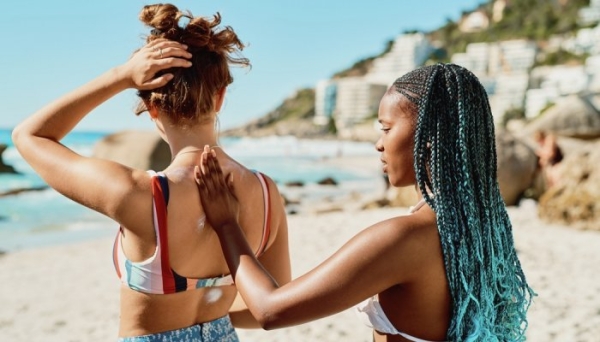
The personal care sector is not immune to misinformation! Convinced that sunscreens block the sun’s beneficial effects for the skin, some social media users are urging people to stop using them. The trend, which has been gaining momentum in recent days, is worrying many specialists because of the health risks it entails. Here’s the lowdown.
Sunscreens are essential products to reduce the risk of sunburn and, by extension, skin cancer. While some people inadvertently forget to make this a habit, others are now announcing that they are voluntarily renouncing it. Over on TikTok, some internet users have declared themselves to be “anti-sunscreen”. According to them, sunscreen is packed with harmful ingredients that prevent the sun’s healing rays from reaching the skin.
Although some of the content linked to the #antisunscreen hashtag has been removed or delisted, it has still managed to rack up 1.7 million views on the favourite social network of younger generations.
Fanciful speeches
One user promoting the risky trend is Shannon Fairweatherr, who claims to have banned sunscreen from her cupboard. She declares in a video: “I refuse to block my skin from the healing rays of the sun.” She goes on to talk about more natural alternatives to protect her skin from the damaging effects of ultraviolet rays, and in particular claims to use coconut oil, which she says “works about 30% as well as sunscreen does, except you’re not slathering yourself in chemicals.“
It’s a similar story for user shesnatural0, who also claims to be “anti-sunscreen” in a video: “Surprised at the amount of people absolutely appalled that I don’t apply sunscreen when it blocks all the nourishing benefits of the life giver of our planet that regulates our bodily processes…“
A British fitness coach by the name of James Middleton has tweeted montages, in which he touts the importance of vitamin D and suggests that sunscreen blocks it. The user, who is not a medical professional, asserts that “high levels of vitamin D make it almost impossible to develop an autoimmune disease. This would put pharmaceutical companies & the healthcare industry out of business. Think about it for a moment. They need you to believe the sun is bad.“
Quite close to anti-vaccine speeches, these false assertions, which are not supported by any scientific study, seem to circulate in the same circles. Faced with this phenomenon, specialists are voicing their concern.
The importance of sun protection
Dr. Blair Murphy-Rose, dermatologist at New York’s Laser and Skin Surgery Center, tells the publication Nylon that short periods of sun exposure (10-15 minutes a day) can be helpful for convert vitamin D to its active form in the body and improving one’s mood, but emphasizes that overexposure has negative effects on our skin health and cosmetic appearance. To which she adds: “All skin types should wear sunscreen, and everyone should avoid jumping on these trends.” The expert also points out that certain skin types that are more sensitive to the sun — such as people with fairer skin or skin cancer in their family medical history, need to take extra precautions.
Dr Paul Banwell, cosmetic surgeon and skin cancer expert, warns of all the dangers of not applying sunscreen: “It’s not just the risk of melanoma …, but all skin cancers that need to be protected against. The main types of which are melanoma, basal cell carcinoma (BCC), squamous cell carcinoma (SCC) and Merkel cell carcinoma (MCC). CC is the most common type of non-melanoma skin cancer worldwide,” he tells Glamour UK.
Fortunately, there are other content creators who are encouraging people to protect their skin from the sun’s harmful effects. One example is Mary Odusami, known as GlowingWithMary on TikTok, who advocates the application of sun protection, especially among black people. In her video, she explains that skin cancer affects everyone, regardless of skin colour, so everyone should wear SPF, responding to a user’s message that black people don’t need to wear sunscreen.
According to France’s Ligue contre le Cancer, the risk of developing skin cancer is 1 in 100. Among their recommendations: avoid exposure during the hottest hours of the day, use appropriate protection products and reapply every two hours.





